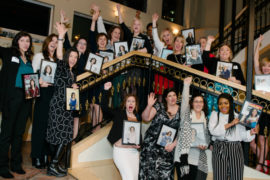By Shelby Rowe Moyer
Clare Haden and her husband, Scott, are big basketball fans, and when the NBA announced the suspension of its season on March 11, the impact COVID-19 would have on her life suddenly became apparent. In a matter of days, COVID-19 was declared a pandemic and a public health emergency in Wisconsin.
On March 13, Clare logged onto her first-ever virtual design conference for the production of “Sense and Sensibility” by Spring Green’s American Players Theatre (APT). Clare primarily works as a voice and speech coach for theater companies across the state, and this production was one of the major employment contracts she had for 2020.
“During the conference, all these amazing designers, actors and directors from all over the country were talking about the magnificent plans they had for the show,” Clare says. “Everyone was wonderful, but it was also like, no one talked about the elephant in the room, which is like, holy s— there’s a global pandemic and theaters are closing down left and right. But yeah, let’s talk about this play we’re probably not going to be able to do… It was very surreal.”
Bracing for Impact
Within a matter of weeks, APT cancelled its entire season, and Clare lost all of the work she had scheduled for 2020. While some of her work was rescheduled for 2021, Clare isn’t sure even that will be feasible.
“With how our country is handling the crisis right now, I’m really not that optimistic that we’re going to be able to do any live performances for a very long time,” she says. “So, I’m not only grieving because I’ve lost all my work, at least for the foreseeable future, but I’m also just grieving for my entire industry, and so many of my friends and artists who are unemployed.”
She was able to secure a position teaching an Acting Skills for Life course this summer at the University of Wisconsin-Madison, with plans to do so again this fall. It makes up about 20% of what she was projected to earn this year, though Clare qualified for unemployment after benefits were expanded to include contract workers.
Navigating the Unknown
All of the uncertainty that continues to swirl is making Clare and Scott question their ability to stay in the performing arts industry.
Scott, who works as the director of marketing and communications for Forward Theater Company in Madison, is still employed. The couple is hoping that remains the case, although it’s difficult to project how theater companies will continue to weather lost revenue due to performance cancellations.
It’s been a roller coaster of emotions, Clare says. How suddenly events transpired made it even more difficult to comprehend. One day she’s working; the next she’s not and she is homeschooling their young son.
There are days Clare grieves her job. There are days she feels content and at peace with being at home with her family. And then there are feelings of guilt, because she knows how painful and scary this period is for so many other people.
There are times when Clare says she will open the door to Scott’s at-home office and give him a look. “He’ll be like, ‘Yep, you go ahead.’ And I’ll get in the car and pick a direction and drive —just so I can cry and feel what I need to feel and be upset by myself somewhere,” she says. “And I get it together, and then come back and pick it up.”
Black Lives Matter & the Arts
Her worst fear, however, is not losing her career. In light of recent racial unrest and the Black Lives Matter movement, Clare says “returning to normal” scares her more. There’s no more “back to normal,” she says.
According to Clare, this is a chance to make some fundamental changes within the industry — ones that are more equitable for everyone.
“The Black Lives Matter movement is so important, and there are so many [systemic] problems and failings at the same time in our own industry that, when it comes back, I hope to God that it comes back better and stronger and a hell of a lot more equitable for those who have not been treated well across the board,” she says.
Clare wants to see theater companies exercise transparency with their spending, incorporate more diversity — from actors to directors to costume designers to stage managers — and to make theater more financially accessible.
It would be devastating, she says, if the world returned to “normal,” and nothing changed for the better.
The Future of the Arts
Clare predicts that, because of COVID, theater could be fundamentally different when it returns. Some theaters have adapted to a virtual format, but it’s not quite the same as when an audience is together, she says, and they’re laughing and smiling at the same moment.
But even though performing arts is struggling, it will never disappear, she says. Theater has been around forever — there’s a need to gather and hear stories.
But it has to evolve, she says. Not just because of the virus, but for the sake of racial equity and accessibility.
“Maybe we don’t spend thousands upon thousands of dollars on the production side of it,” she says. “Maybe it’s just a bunch of actors getting together in a small room and telling a story. [Maybe] we go back to sitting around a campfire and telling a story.”




